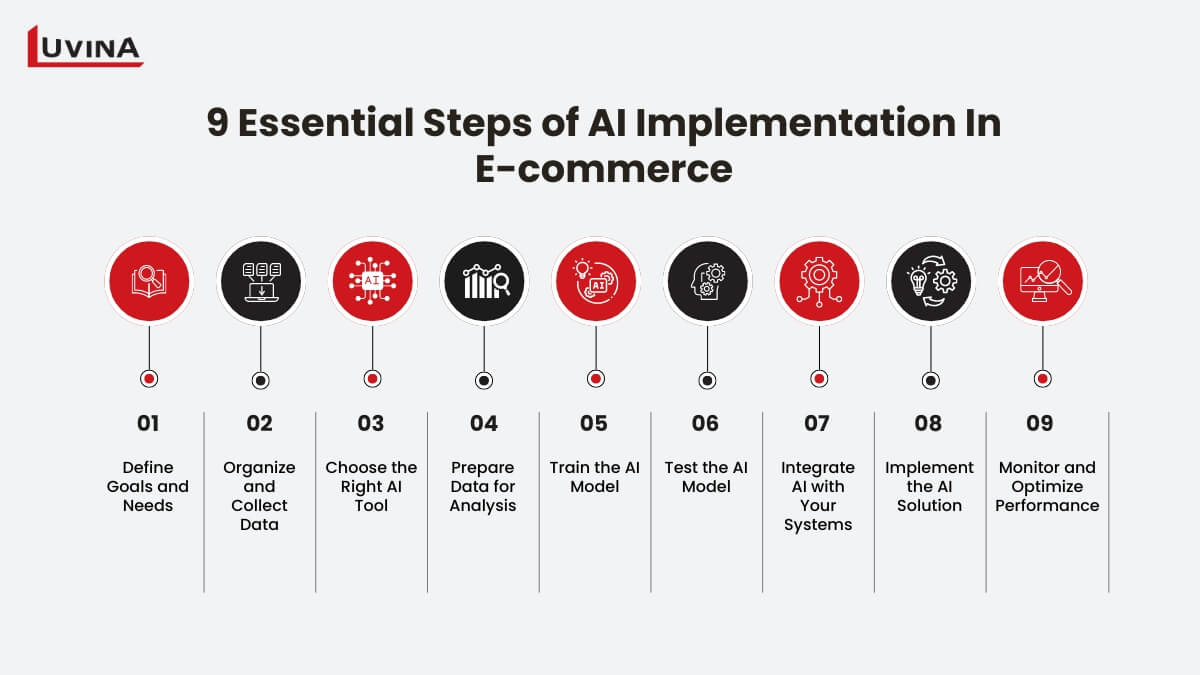The AI in e-commerce is the trend you cannot afford to ignore if you want your business to truly stay competitive, with continuous change in the market. Whether you are the front store owner or the wholesaler, you seem to experience AI at least once if you play any part in the world of e-commerce. For businesses, AI can assist with everything from pricing and logistics to customer service and optimization for search.
Is there not a fear of the time when AI will replace humans? Why not use this trend to our benefit instead? In the article below, we will be discussing the role of AI in e-commerce and using the best AI for e-commerce.
Benefits of Using AI in E-commerce Companies
AI in e-commerce is estimated to reach $14 billion by 2028. This number shows the limitless possibilities of AI, and how fast this technology is progressing, opening wide possibilities for any company. The following are advantages that artificial intelligence in e-commerce might bring to enterprises:
- Enhancing customer interaction and service quality
The major advantage of using AI in e-commerce is to make the overall shopping experience much more joyful for the customers. AI can analyze customer feedback from multiple touchpoints to measure engagement. E-commerce websites may use that data to provide a seamless experience. Additionally, gathering data about customers enables business enterprises to identify shopper preferences quite easily and make personalized offers. AI-powered chatbots and virtual assistants provide instant customer support.

- Optimizing data
AI analyzes big and valuable data sets, in return enabling the business to make wiser and data-driven decisions.
- Boosting productivity, optimizing time and resources
AI-powered commerce automates repetitive tasks like fulfilling orders, processing payments, and managing emails. This unloads employees and allows them to focus on core business activities and other strategic works. This will also help the business reduce labor costs and ensure improved operational efficiency.
- Increasing sales
AI in e-commerce supports the selling process by collecting data that is useful for processing customers. This information allows businesses to contact the appropriate potential customers with an appropriate message at the appropriate time.
AI use cases in e-commerce
AI can assist in nearly all operational processes of AI e-commerce companies, and here are some common use cases:
1. Personalized product recommendations
Today, customer thinking, shopping habits, and expectations have shifted. More than ever, they desire personalized experiences when shopping online. Retailers that can deliver these personalized experiences gain more customer trust and loyalty. Currently, only 1 in 10 retailers admit they can fully implement personalization features across all channels. This presents a significant opportunity for AI implementation in e-commerce to personalize the shopping journey.

So, how does AI in e-commerce provide personalized product recommendations?
AI filters information from past customer data and behaviors like search history, purchase history, and click patterns. Then, such data is fed to the filtering tools with algorithms that would suggest to customers the most relevant items. You’ve often seen this feature in sections like “You Might Also Like” or “Customers Who Bought This Also Bought,” where businesses suggest items related to those customers added to their carts or bought previously.
Personalized product recommendations give a boost to your shopping experience through rapid views of just what you want and suggestions for items you will really appreciate. AI can reduce costs for personalization, increase marketing effectiveness by up to 10-30%, increase customer engagement by up to 3-5%, and increase customer satisfaction by up to 5-10%.
2. Chatbots and virtual assistants
In the age of AI in e-commerce, chatbots and virtual assistants represent a company’s customer service, helping to answer customer inquiries and making shopping more convenient. Here are some tasks that chatbots and virtual assistants can assist businesses with:
- Effective customer interaction: They can efficiently handle simple transactions, process orders, and provide personalized offers.
- Data collection: They gather customer data to improve services and develop products.
- Streamlining payment processes: They enhance the payment experience for customers.
- 24/7 customer service: They offer immediate responses and direct support to resolve complex customer issues promptly.
>> Also read: Enterprise AI Chatbot Development Service
3. Pricing Dynamic
Dynamic pricing involves adjusting prices and offers based on real-time user behavior. Artificial intelligence in e-commerce examples have shown that, with the power of modern technology, businesses can predict optimal discount opportunities and determine the minimum necessary discount levels to effectively boost sales.

With the help of the best AI for e-commerce, retailers can achieve more flexible multi-channel pricing. AI provides insights into products as well as competitors, allowing businesses to adjust their offerings and pricing more easily. In particular, companies can use AI to compare prices with competitors, ensuring that customers always receive the best deals.
4. Sales and demand forecasting
AI in e-commerce would leverage machine learning algorithms to analyze e-commerce in real time, including sales data, demographic information, and many other elements to predict future demand for certain products or services. The information is a basis for improving the inventory management of the business, logistics planning, and avoiding both overstocking and stockouts. Demand and sales forecasting can help a company detect market trends and opportunities, and hence aid in strategy adjustments to stay ahead of the competition.
5. Auto-generated content
As time goes by, it has become a given to see the e-commerce industry deploying AI to auto-generate content. AI in e-commerce tools can analyze product specifications and generate product descriptions using very natural language techniques. An example of the ability of AI is to apply writing frameworks like AIDA (Attention, Interest, Desire, and Action) to compose compelling, unique, and optimized content. This capability not only enhances the quality of product descriptions but also improves engagement and conversion rates, making the shopping experience more appealing to customers.
Step by step: AI Implementation In E-commerce
AI implementation in e-commerce can be very time-consuming; however, it has many advantages connected with the improvement of customer experience, pricing optimization, sales increase, and simplification of management. To simplify this process, you should divide it into smaller steps.

Step 1: Define Goals and Needs
The first step in artificial intelligence in e-commerce implementation is identifying what you need AI for, whether to boost sales, enhance customer service, or a bit of both. Having clear business goals and challenges will go a long way in pinpointing which AI applications would be best to suit those particular needs.
Step 2: Organize and Collect Data
Once you have defined your goals, then comes the gathering and organization of the data you shall need. Focus on the capturing of information from sources through which your objectives are channeled, like customer interactions, sales data, product information, market data, and levels of inventory.
Step 3: Choose the Right AI Tool
Select the AI in e-commerce solution that best fits your business needs. You can either purchase individual AI tools or opt for comprehensive packages that provide a variety of AI-powered commerce applications.
Step 4: Prepare Data for Analysis
Before launching your AI-powered commerce solution, preparation of data for analysis is very important. This means cleaning and organizing your data in such a way that it becomes ready for analysis by the AI that will provide accurate insights.
Step 5: Train the AI Model
Training the AI model involves feeding it with relevant data and teaching it how to make accurate predictions and recommendations based on that data.
Step 6: Test the AI Model
After training, it’s crucial to ensure that your AI in e-commerce system works as expected. Perform A/B testing or compare its performance with traditional methods to verify its accuracy and effectiveness.
Step 7: Integrate AI with Your Systems
Integration involves allowing AI to access and share data across your e-commerce platform, sales software, and CRM systems for e-commerce. This enables seamless operation and real-time data analysis.
Step 8: Implement the AI Solution
Once testing and refinements are complete, you can officially deploy your AI solution for e-commerce. This typically includes integrating AI with your e-commerce website, mobile apps, or other business channels.
Step 9: Monitor and Optimize Performance
Monitoring performance via AI over a period of time. Be all ears for customer feedback, sales metrics, and engagement data as you use these to make changes to your AI system.
AI in e-commerce case study
AI is becoming increasingly popular and plays a vital role in the e-commerce sector, as evidenced by the fact that finding artificial intelligence in e-commerce examples is not difficult at all.
1. Shopify
Shopify stands out as a notable AI in e-commerce case study. By using AI, Shopify has made search functions smarter.

Typically, traditional search engines only provide accurate results if buyers know exactly what they are looking for. But customers don’t always have the right words to describe what they are searching for. This is why Shopify has leveraged AI to understand the intent behind the customer’s search without needing exact keywords. Specifically, Shopify offers a feature called semantic search. This feature considers elements like synonyms, related concepts, or even product image data.
For example, if a customer types “summer workout clothes,” Shopify doesn’t just return results that match “workout clothes” and “summer” but also understands the user’s intent of searching for clothes suitable for exercising in warm weather. Therefore, the search results might display items like breathable tank tops, sweat-wicking leggings, or shorts, even though these specific keywords were not directly searched for. This advanced AI-powered search function helps customers find results they didn’t even directly look for.
2. Amazon
One of the next notable examples of AI in e-commerce is the giant Amazon. In Amazon’s case, artificial intelligence has provided an extremely cost-effective way to complete tedious tasks no one wants to do—product descriptions. Amazon uses an AI tool that analyzes data such as product names, specifications, and reviews to generate compelling descriptions based on these aspects. This feature saves sellers a lot of time and ensures their products are optimized for search engines.

3. Photobox
Another AI in e-commerce case study is Photobox. Photobox has integrated an AI-powered chatbot into its customer service. This AI chatbot can interact with customers in multiple languages and is available 24/7 to answer customer queries, guide them in product searches, troubleshoot problems, and assist with many other basic tasks. This feature is particularly useful for Photobox during peak seasons when the company doesn’t have time to train new agents.

Summary
The integration of AI in e-commerce has been and will continue to significantly transform the operations and business strategies of retailers. Staying ahead of and understanding these technological advancements will give your business an edge, allowing you to better meet customer demands and create more value.
If you’re unsure about which AI solution is best suited for your business, contact Luvina for a free consultation. We are currently implementing AI for our clients and delivering impressive results. Luvina is committed to freeing you from manual tasks so you can focus on your core business activities and build stronger relationships with your customers. Learn more about how to automate your e-commerce business with Luvina today.
Related Posts:









Read More From Us?
Sign up for our newsletter
Read More From Us?
Sign up for our newsletter